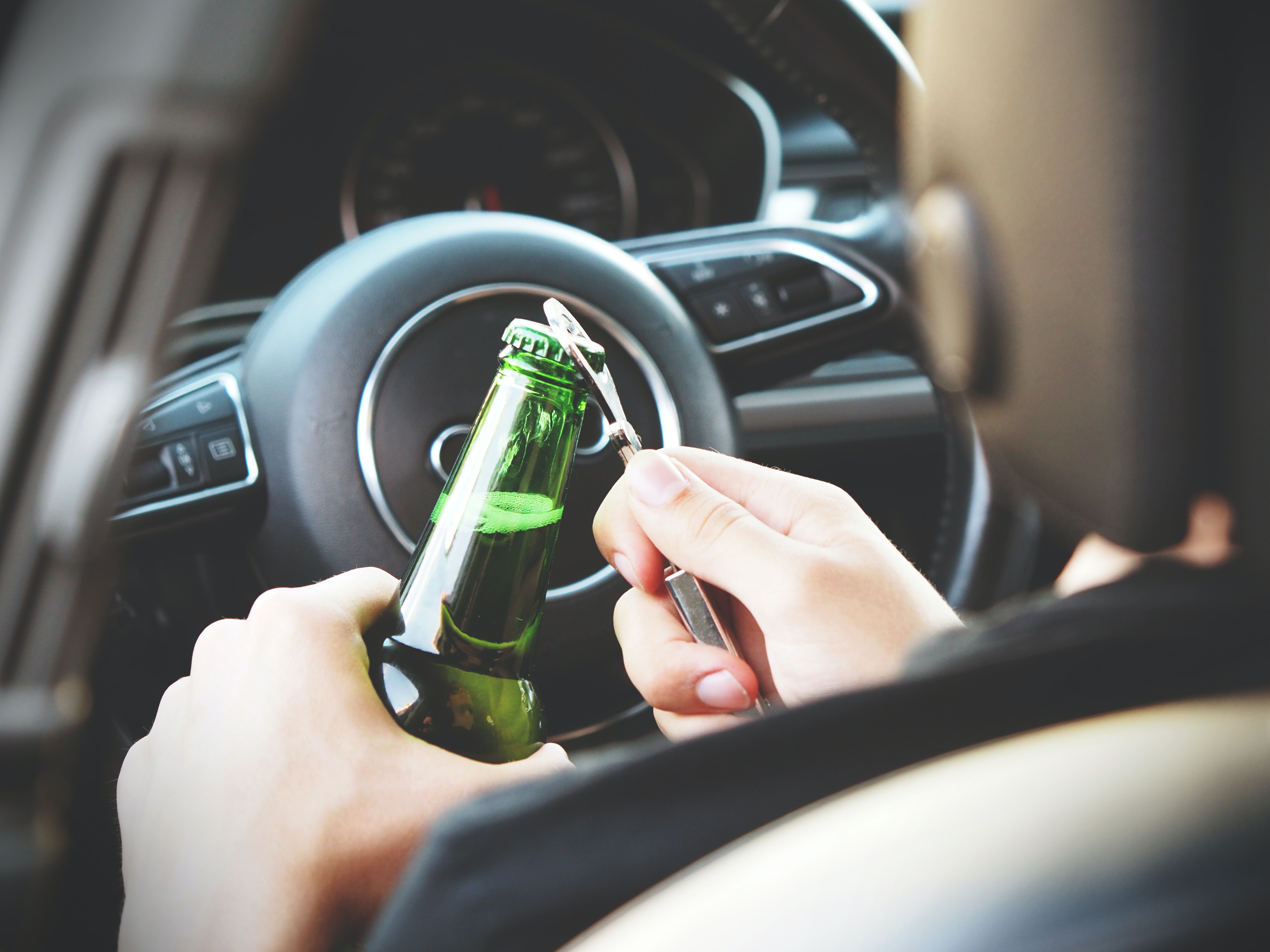The penalty for a DUI in all 50 states and D.C. can vary, but most include a fine, imprisonment for up to 30 days, community service, and possibly a license suspension.
Alcohol abuse is one of the top preventable causes of death globally. One of the most common places these deaths occur is behind the wheel. But not all states deal with this problem in the same way. In fact, each state has passed various laws to combat the problem of drunk driving and alcohol-related deaths on the road. Here’s how open container laws differ from state to state and how they’re enforced.
What’s Different?
Three people are driving down the road, along with a passenger in each vehicle. All three are pulled over by the police. When each police officer approaches the window, there is an open can of beer in the cupholder. What happens next? The answer is it all depends on the state.
If you think about what happens next, you probably have an answer based on your experience or people you know who might have experienced this scenario. However, many people are unaware of just how much it depends on where you live in the United States. Things have gotten much more complicated from the days when alcohol was outlawed at the federal level. But after that short stint, the legal status and the laws that surround alcohol have been an issue of state’s rights. Because of this, your state determines jail time or a free pass.
In the example above, how the police handle it will be determined by three levels of severity seen in the way each state enforces open containers of alcohol:
- Whether the driver is intoxicated
- Whether the passenger is at least 21 years old
- Whether there is an open container of alcohol, period.
To be clear, it is illegal to drive while intoxicated by alcohol in all 50 states and the District of Columbia. With that said, as of 2022, the first level applies to Connecticut, Delaware, Mississippi, and Missouri. The laws in those states do not restrict the driver or passengers of the vehicle when there is an open container of alcohol, although there are exceptions. Mississippi is perhaps the most notorious for being a state with no laws against public drinking as long as you are over the legal drinking age and under the intoxication limit. Theoretically, you can legally drink and drive in Mississippi, which means that if the scenario took place in that state, the driver and the passenger would have broken no laws on the books because the driver is not intoxicated.
The second level applies to states such as Rhode Island and Tennessee, where it is illegal for drivers to consume alcohol, but not passengers who are at or over the legal drinking age. However, limits to this apply in different cities, such as banning open-air passenger vehicles or unenclosed party buses in Nashville.
Finally, the third level is what most people are familiar with because it applies to most states in the country. Open container possession and/or consumption is illegal, regardless of whether passengers are in the vehicle. However, there are exceptions to this as well. In Florida, open container laws do not apply to commercial passenger vehicles or when open wine is transported in a locked trunk or behind the back seat of the vehicle. Again, this will vary by state, and each county is free to enact stricter rules that apply in some and not others.
What These Laws Say About Alcohol Abuse

In each scenario, however, it is illegal to drive while intoxicated, and no level of intoxication is acceptable. Regardless of where it occurs, it is likely that a police officer will investigate whether the driver is intoxicated, and taking a breathalyzer test is almost guaranteed. The penalty for a DUI in all 50 states and D.C. can vary, but most include a fine, imprisonment for up to 30 days, community service, and possibly a license suspension.
Alcohol abuse is a controversial issue, especially when comparing how differently each state tackles the topic. Regardless of what we can get away with from state to state, not drinking and driving is the safest option. However, the problem is intensified by the issues surrounding alcohol abuse that none of these laws cover. While each of these laws is likely trying to curb drunk driving with a strict no open container policy or by ensuring that people choose to be drinking passengers rather than drivers, they aren’t enough to stop unhealthy drinking habits altogether.
When alcohol addiction is developed, even so-called high-functioning alcoholics run the risk of taking their chances of drinking and driving, regardless of their state’s laws. The problem deepens when alcohol is mixed with illicit or prescription medicines such as Xanax, which can be a deadly combination.
At the very least, mixing alcohol with other drugs can make people more sensitive to the effects of both. Also, it is very easy to misjudge your ability to drive, even if you drink at what you consider a safe level. While knowing the laws in each state is helpful, the willingness to push the limits of what is considered legal could be a sign that alcohol abuse is a controlling factor in our lives. If that is the case, it is important to seek help to protect ourselves and everyone else on the road.
Sources:
Delphi Health Group. (n.d.). Alcohol Abuse and Addiction Treatment Guide. Retrieved https://delphihealthgroup.com/alcohol/
Britannica. (n.d.). Prohibition. Retrieved https://www.britannica.com/event/Prohibition-United-States-history-1920-1933
Driving Laws. (n.d.).Can a Vehicle Passenger Drink Alcohol? Can I Have an Open Container in my Car?. Retrieved https://dui.drivinglaws.org/resources/can-a-passenger-drink-alcohol.htm
Mississippi Lawyers. (2021, Aug 26). Is Public Drinking Legal in Mississippi? Retrieved https://www.mississippi-lawyers.com/blog/is-public-drinking-legal-in-mississippi/#:~:text=Essentially%2C%20there%20is%20no%20real,has%20no%20open%20container%20laws.
Oberman and Rice. (n.d.) Open Container of Alcoholic Beverages. Retrieved https://www.tndui.com/criminal-defense/open-container-of-alcoholic-beverages/
Tennessean. (2021, Dec 1). New Nashville law banning alcohol on open-air party vehicles in effect. Retrieved https://www.tennessean.com/story/news/local/davidson/2021/12/01/nashville-party-vehicles-alcohol-banned-law-fines-davidson-county-tennessee/8815379002/
Bernstein Lawyers. (2019, Nov 27). What Is Florida’s Open Container Law? Retrieved https://bernsteininjurylaw.com/blog/floridas-open-container-law/#:~:text=First%2C%20you%20must%20have%20a,last%20seat%20of%20the%20vehicle
Delphi Health Group. (n.d.) The State of Drunk Drivers Across America Retrieved https://delphihealthgroup.com/the-state-of-drunk-drivers-across-america/
Delphi Health Group. (n.d.) Drinking and Driving Do Not Mix: Here Are Options to Consider. Retrieved https://delphihealthgroup.com/blog/drink-and-drive/
Delphi Health Group. (n.d.) How to Recognize a High-Functioning Alcoholic: Signs & Symptoms. Retrieved https://delphihealthgroup.com/alcohol/high-functioning-alcoholic/
Delphi Health Group. (n.d.). Overdose Risk of Mixing Benzodiazepines with Alcohol. Retrieved https://delphihealthgroup.com/alcohol/mixing-with-benzos-overdose/
Delphi Health Group. (n.d.). How to Identify Signs of Alcohol Abuse and Addiction. Retrieved https://delphihealthgroup.com/alcohol/identifying-signs/


Join the conversation!